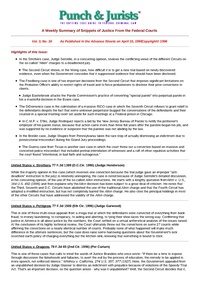Case held that 18 USC § 1983(d)(1)(A) does not authorize pre-trial restraint of substitute assets.
Although the Court affirmed an award of only nominal damages in this excessive-force case, it did also hold that "if it is clear from the undisputed evidence that a plaintiff's injuries were caused by a defendant's use of excessive force, the jury's failure to award some compensatory damages will …
Important case in which the Court held that the parolee had a due process right in preventing parole bureau from notifying his employer of his status.
This is one of those vintage decision by Judge Easterbrook in which he forcefully and with his usual perspicacity attacks what Judge Sporkin once referred to as the "yo-yo sentencing practices" of the U.S. Parole Commission. Williams v. U.S. Parole Commission, 860 F.Supp. 1 (D.D.C. 1995). The issue involved …
Judge Cooper adds to the growing controversy of the fairness of the crack/cocaine sentencing disparities with this novel holding. First he held that because the molecular formula for crack and cocaine were identical, the statute was ambiguous and would not be enforced under the rule of lenity. Second, he …
One of the many issues raised in this appeal from various RICO convictions was whether, for grouping purposes under U.S.S.G. § 3D1.4, the court is allowed to consider crimes for which the defendant has not been convicted or crimes that were not stipulated. The Court firmly rules that "unconvicted, …
In this case, the Court holds that defendants convicted of violating the "schoolyard" statute (21 U.S.C. § 860) are not entitled to relief from the applicable mandatory minimum sentence under the "safety valve" provisions of 18 U.S.C. § 3553(f). In the process, the Court reviews the limited legislative history …
This is a rare but extraordinary decision in which Judge Shapiro dismisses an indictment because she found that prosecutor Michael P. Doss of the U.S. Attorney's Office in Philadelphia engaged in persistent acts of misconduct before the grand jury. The Judge acknowledged that its power to dismiss an indictment …
Some six months after the defendant was released from prison on a prior charge, he was arrested on a new charge to which he pled guilty. The Government and the defendant stipulated that the new charge was a grade B violation and that the recommended sentence under U.S.S.G. § …
This case deals with the permissible scope of travel restrictions that are imposed on probationers by the courts and the Probation Office. Here, the appellant sought relief from the Court after Judge Wexler repeatedly denied him permission to travel to Russia during his term of probation on the ground …
Important case in which the Court held that the parolee had a due process right in preventing parole bureau from notifying his employer of his status.
After the defendant in this case was released from prison in early 1982, he began working for a mental health services organization. …
This is one of two important decisions decided by the Second Circuit during March that deals with the power of the Probation Office to harass its wards who are on supervised release. In this case, the appellant sought relief from the Court after Judge Wexler repeatedly denied him permission …
This case is a good example of how difficult it is to get a new trial based on newly discovered evidence under Rule 33 of the Fed.R.Crim.P. The issue involved was whether the Government should have disclosed some rather incriminating evidence that one of its star witnesses had "received …
Court held that it was improper to base an upward departure on the quantity of the drugs involved.
One of the issues raised in this case was a challenge to an upward departure because of the "sophistication, the enormous amount of drugs involved in this operation over a …
After the defendant in this case was released from prison in early 1982, he began working for a mental health services organization. No condition of the court or his certificate of parole required him to notify employers of his parolee status. However, the New Jersey Bureau of Parole had …
